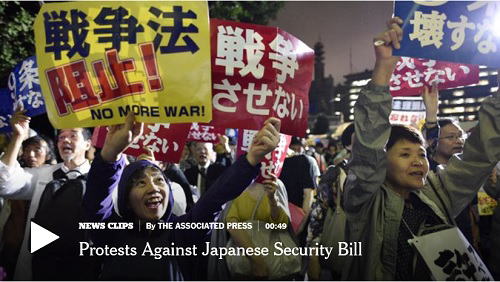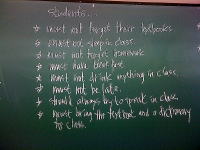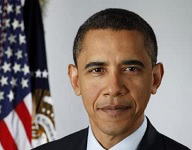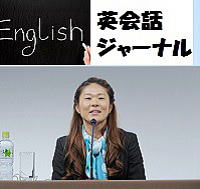箕面.の英会箕面.の英会話教室.:英会話.KEA.-箕面. 小野原、彩都. 茨木話教室.:英会話.KEA.-箕面. 小野原、彩都. 茨木
箕面、小野原、彩都、茨木.の.英会話スクール.です
・個人レッスンが中心です ・講師は日本人!
・英検、TOEIC、ビジネス英語の特別授業も好評です。
ギャラリー
安保法制が国会で強硬採決されました。知らせ
Japan’s Parliament Approves Overseas Combat Role for Military

TOKYO — In a middle-of-the night vote that capped a tumultuous struggle with opposition parties in Parliament, Prime Minister Shinzo Abe of Japan secured final passage of legislation on Saturday authorizing overseas combat missions for his country’s military, overturning a decades-old policy of reserving the use of force for self-defense.
The legislation had been expected to pass; Mr. Abe’s governing coalition controls a formidable majority in the legislature. But analysts said the grinding political battle and days of demonstrations that accompanied the effort could hurt his standing with a public already skeptical of his hawkish vision for Japan’s national security.
The debate often doubled as a forum for airing views about Japan’s most important ally, the United States. Many were hostile.
“If this legislation passes, we will absolutely be caught up in illegal
American wars,” Taro Yamamoto, a leader of a small left-leaning opposition
party, said in a committee debate on Thursday. The debate ended with lawmakers
piled on top of one another in a melee for control of the chairman’s microphone.
On Friday, Mr. Yamamoto held up the voting by taking a slow-motion “cow walk” to the podium to cast his ballot. Other opposition groups entered symbolic censure motions against Mr. Abe and officials in his Liberal Democratic Party or made long, filibuster-like speeches, often repeating the conviction that a military with expanded powers would end up being dragged into an unjustified American war.
“We must not become accomplices to murder,” said Mizuho Fukushima of the Social Democratic Party. Similar sentiments have been echoed — usually in less provocative terms — by newspaper columnists, political scientists and members of the general public.
The opposition’s obstructionist tactics delayed Mr. Abe’s victory until after 2 a.m., but could not prevent it.
Mr. Abe’s critics have a variety of grievances against the defense legislation. Not least is the question of its constitutionality: In multiple surveys of constitutional specialists, more than 90 percent have said they believe that it violates Japan’s basic law, laid down by the United States in the postwar occupation, which renounces the use of force to resolve international disputes.
But a less abstract fear of being “caught up in war” has been just as important in fueling opposition to the legislation, exposing a strain of public unease about the United States-Japan alliance that is usually kept out of view.
Japan has accepted American protection for ever since the end of the United States’ occupation, and today there are more than 40,000 United States military personnel stationed in the country. Yet the arrangement has come at the cost of Japanese independence, many here believe. The trade-off has taken on new significance now that Japan could be asked to risk the lives of its own soldiers and sailors for the United States in return.
“Japan is caught between fear of entanglement and fear of abandonment,” said Tsuneo Watanabe, a senior fellow at the Tokyo Foundation, a policy research group. “It’s partly about public distrust of Japan’s own government. People think Japanese leaders are too weak to say no to the U.S.”
Mr. Abe argues that Japan needs to play a more active role in the alliance in order to strengthen it against threats like the growing military power of China and a nuclear-armed North Korea. His legislation has won support from United States policy makers, who have welcomed a larger role for Tokyo in regional security at a time when American resources are increasingly stretched.
But a central question for many Japanese is whether loosening restrictions on the military will put Japan on a more equal footing with the United States, as Mr. Abe has argued, or, as critics contend, turn it into an American “deputy sheriff” in Asia, its new military powers at Washington’s disposal.
Leftist politicians and peace campaigners have been the most vocal proponents of the latter view, but they are not alone. Some to the right of Mr. Abe are also concerned. Yoshinori Kobayashi, a right-wing author and manga artist, came out against Mr. Abe’s plans at a gathering of foreign journalists last month, saying, “We must not be caught up in American wars of aggression.”
Such attitudes are partly fueled by the war in Iraq, though they have existed in one form or another at least since Vietnam. Although Japan did not fight in Iraq, its government was a vocal supporter of the war and sent troops from the Self-Defense Forces, as the military is known, to play a noncombat rebuilding role during the American occupation.
“Japan has not been careful about choosing when to support the United States, which is the biggest worry,” said Kiichi Fujiwara, a professor of international politics at Tokyo University who was otherwise broadly supportive of the legislation.
He said the main aim of the changes was to allow Japanese and United States forces to coordinate responses to contingencies on Japan’s doorstep, such as any destabilization of the Korean Peninsula, not to get Japan involved in faraway wars. And he noted that the risk of military entanglement runs both ways: American leaders, for instance, worry about being drawn into a potential conflict between Japan and China over disputed islands in the East China Sea.
”That’s not something you hear about in Japan,” Mr. Fujiwara said. “There’s this assumption that it’s America that will get Japan into trouble, when it could just as easily be the other way around.”
Mr. Abe’s government has kept a number of limits on military deployments in the new legislation. The Self-Defense Forces will be able to engage in combat overseas to protect allies, but only when all peaceful options are exhausted and not intervening would threaten “the lives and survival of the Japanese nation.” Critics say those criteria are dangerously vague.
Mr. Abe has said it is “inconceivable” that Japan might be caught up in an Iraq-style war, but many average citizens remain wary, seeing the changes as a slippery slope. In several surveys conducted by news organizations in May, after Mr. Abe first made that pledge, only one in six respondents found it convincing.
Outside the Parliament building on Friday, that doubt was the prevailing sentiment. Crowds over the three days leading up to the final vote reached between 10,000 to 30,000 at peak times, according to estimates by the police and the Japanese news media.
“American’s power has been weakening and they can’t bear all the military costs on their own, so they want Japan to share the costs,” said Taketo Yamanouchi, an office worker from Tochigi Prefecture, north of Tokyo, who had traveled to the capital to join the demonstration. “My impression is that Japan is legislating the security bills in response to the U.S.’s request.”
Yoshie Baba, a history student, worried that backing the United States in places like the Middle East could earn Japan dangerous enemies. “If Japan shares the same policy beliefs with the States, Japan could be targeted by terrorists just like Britain and other U.S. allies,” she said. “I am concerned Japan could be involved in conflicts or troubles.”
英会話教室
関西イングリッシュアカデミー
〒562-0023
箕面市粟生間谷西1-1-2
無料体験レッスン
お問合せ 080-6117-4101
英会話.KEAのホームページをご覧頂きまして誠に有難う御座います北摂(大阪府箕面市東部)にある英会話教室.です。
最寄駅は北千里です。
171号線 小野原交差点からすぐです 地図
*生徒さんの声・反響 >>>
*英会話.レッスン日記 >>>



